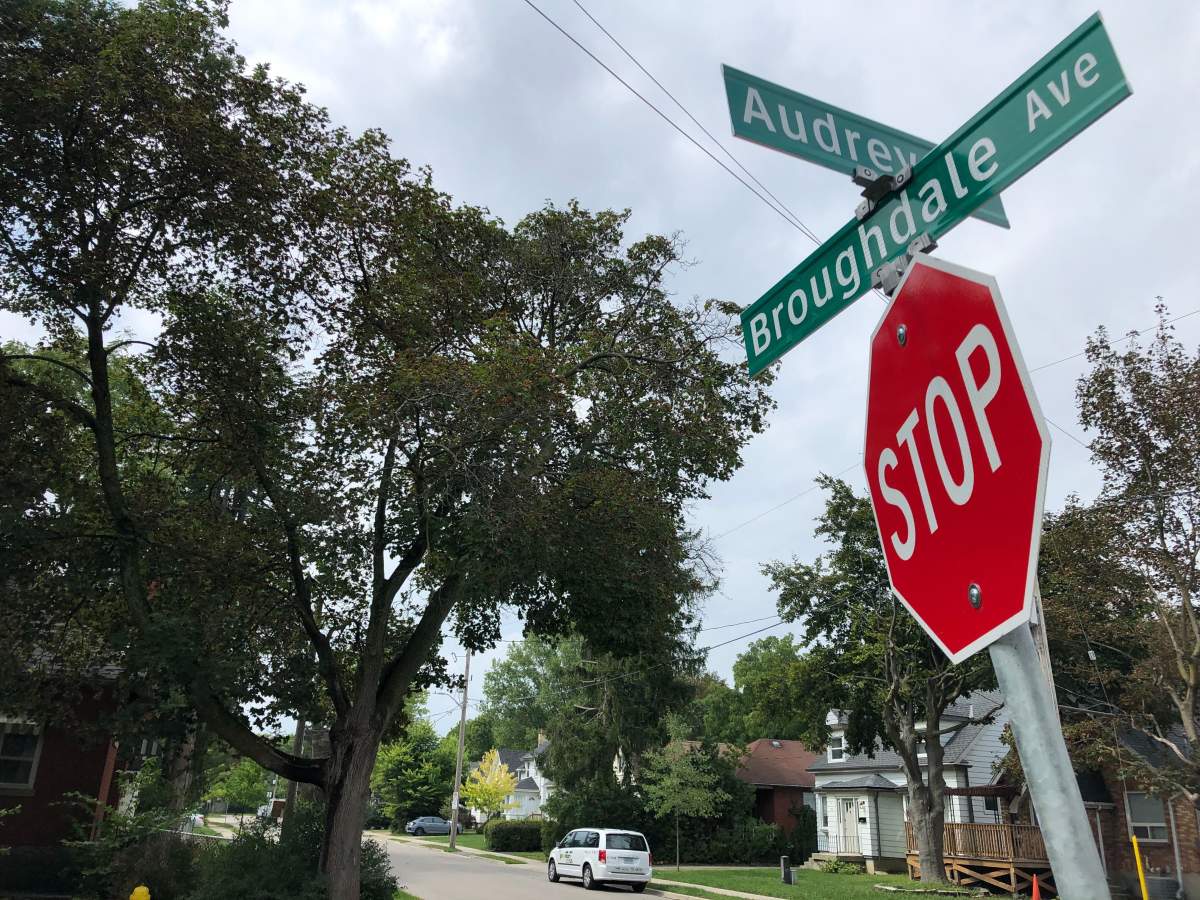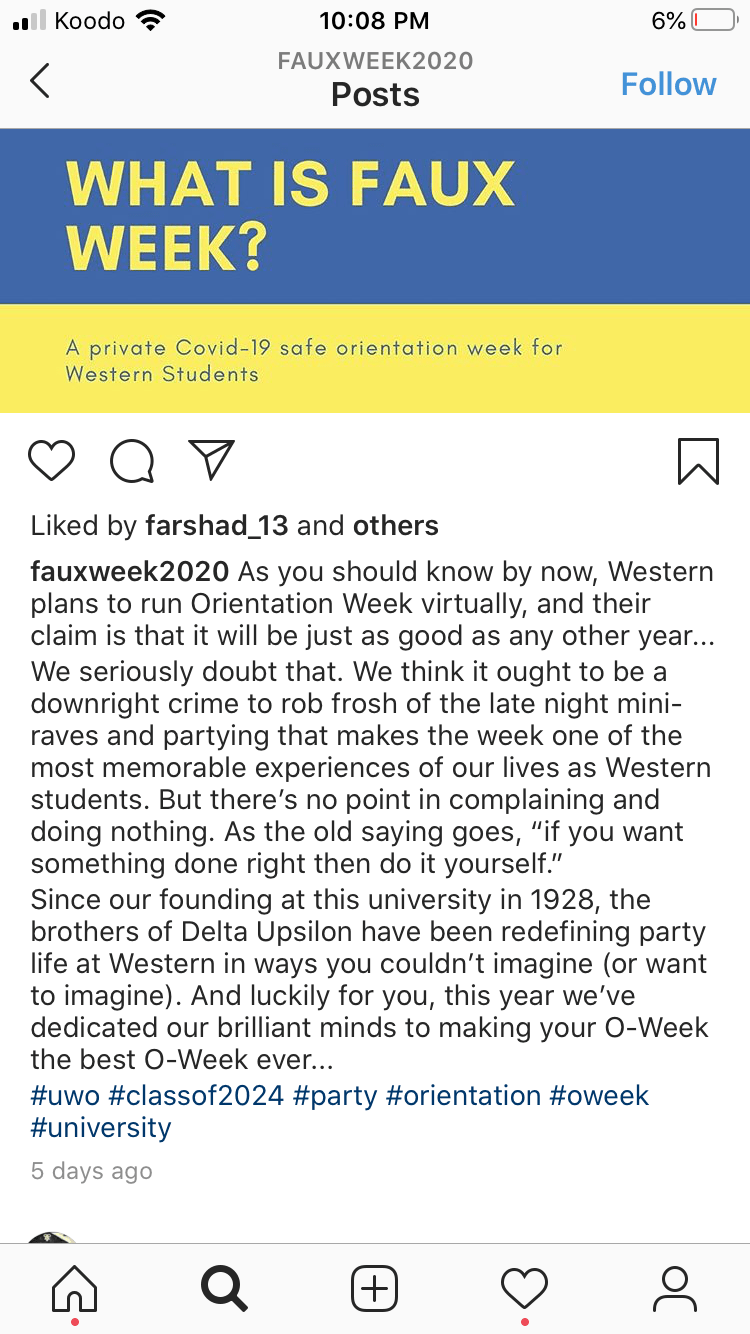A London, Ont., fraternity’s plan to host a series of in-person events to supplement Western University’s virtual orientation week has been cancelled, but coronavirus concerns linger as students return to the city.

‘Faux Week,’ a play on words for Western’s official orientation week, commonly referred to as O-Week, was to be held by Delta Upsilon, a fraternity at 294 Central Ave.
The plans were shared on a now-deleted Instagram account called ‘fauxweek2020’ that promoted “a private COVID-19 safe orientation week for Western Students.”
On Wednesday, Western’s associate vice-president of student experience Jennifer Massey told Global News that after “some really thoughtful dialogue” with the fraternity, Faux Week had been cancelled.
“It became apparent that (the fraternity) really wanted to step up… I’m delighted that they’ve made that decision,” Massey said.
For Ward 6 Coun. Phil Squire, his concerns lie beyond the now-cancelled in-person alternative to Western’s orientation week.
The city councillor represents an area that contains Western’s campus, along with London’s Old North neighbourhood, which often serves as a home to many students returning for the school year.
“There’s a high level of anxiety in my community,” Squire said. “We’ve done so well with COVID to date, in terms of keeping the number of cases low, and they don’t want to see a surge.”
House parties are a large concern, with the councillor noting that noise complaints are already starting to come in as students return.

Get daily National news
Once those complaints are combined with complaints surrounding COVID-19 health guidelines, Squire worries municipal authorities may be stretched thin.
“We cannot be at every party at every house at the same time,” Squire said.
Jillian Rizzuto and Nicolas Mateus are a pair of third-year Western students who spent their Wednesday getting settled into London for the school year.
The two worry that student partying will continue as normal, despite the ongoing pandemic.
“There’s no way it’s not going to be a COVID hotspot,” said Rizzuto. “First years? Not a chance they’re going to be careful with their interactions. It’s the year that kids know to party it up and I don’t think kids now are still going to be careful.”
Mateus, who works in a restaurant, said he’s seen customers neglect health regulations such as masking and worries a similar attitude will carry over into the student population.
“People don’t want to do the minimum thing that really doesn’t require that much effort… Are they really going to do something that’s going to take away all their fun from the university experience? I somehow doubt it,” said Mateus.
Similar expectations are held by fourth-year students Jack Moroney and Luca Cioffi.
Both from Calgary, the two decided to return to the city after seeing a number of friends do the same.
“I didn’t come out to London to just kind of quarantine for 24-hours a day, you can kind of find a happy medium where you’re not being stupid, but you’re not kind of shelled in,” Cioffi said.
But Cioffi worries younger students may not find the happy medium of socializing responsibly amid a pandemic.
“Quite honestly, if I was in first year, I probably would’ve gone to these parties just because it’s such a new situation and you gotta make friends somehow,” Cioffi said.
“I think these parties that are happening, I think a lot of people are still going to treat it like there’s no pandemic,” Moroney added.
While students off-campus have already begun making their way back to the city, Western’s on-campus students are set to move in starting Thursday.
The university, along with the University Students’ Council, has put together a number of plans to curb the spread of COVID-19, something that Squire said he has faith in.
That includes the Take Care Western Commitment, a campaign that aims to provide students with everything they need to know when it comes to staying safe during the school year.
Massey added that Western will be taking an education-first approach in enforcing health regulations, with the university avoiding the need to demand compliance.
“Simply telling people what to do is actually not that effective. What’s most effective is helping them understand why we want them to do it, and the implications of the harm that is caused when they don’t adhere to whatever those regulations are,” said the associate vice-president of student experience.
When asked about how students may be disciplined for ignoring the rules, Massey referenced the student of code conduct, adding that, “I can certainly see them being invited into my office for a conversation.”














Comments
Want to discuss? Please read our Commenting Policy first.